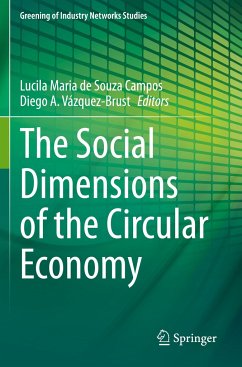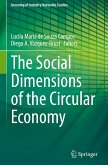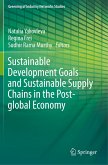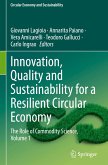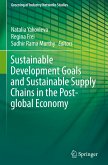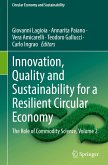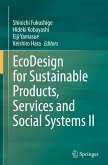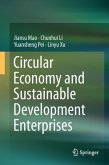The Social Dimensions of the Circular Economy
Herausgegeben:de Souza Campos, Lucila Maria; Vázquez-Brust, Diego A.
The Social Dimensions of the Circular Economy
Herausgegeben:de Souza Campos, Lucila Maria; Vázquez-Brust, Diego A.
- Broschiertes Buch
- Merkliste
- Auf die Merkliste
- Bewerten Bewerten
- Teilen
- Produkt teilen
- Produkterinnerung
- Produkterinnerung
The main theme of this book is the social dimension of the circular economy (CE). This book's objective is to provide a foundation for the discussion of social aspects of CE that also allows the integration of CE with the UN SDGs. The circular economy is increasingly becoming the consensual pathway for a transition towards sustainable production and consumption that balances the economic and ecological pillars of sustainable development. However, researchers have noted that the social dimension of sustainable development is noticeable missing or, at best, weakly developed in CE ideas and…mehr
Andere Kunden interessierten sich auch für
![The Social Dimensions of the Circular Economy The Social Dimensions of the Circular Economy]() The Social Dimensions of the Circular Economy108,99 €
The Social Dimensions of the Circular Economy108,99 €![Sustainable Development Goals and Sustainable Supply Chains in the Post-global Economy Sustainable Development Goals and Sustainable Supply Chains in the Post-global Economy]() Sustainable Development Goals and Sustainable Supply Chains in the Post-global Economy66,99 €
Sustainable Development Goals and Sustainable Supply Chains in the Post-global Economy66,99 €![Innovation, Quality and Sustainability for a Resilient Circular Economy Innovation, Quality and Sustainability for a Resilient Circular Economy]() Innovation, Quality and Sustainability for a Resilient Circular Economy226,99 €
Innovation, Quality and Sustainability for a Resilient Circular Economy226,99 €![Sustainable Development Goals and Sustainable Supply Chains in the Post-global Economy Sustainable Development Goals and Sustainable Supply Chains in the Post-global Economy]() Sustainable Development Goals and Sustainable Supply Chains in the Post-global Economy93,99 €
Sustainable Development Goals and Sustainable Supply Chains in the Post-global Economy93,99 €![Innovation, Quality and Sustainability for a Resilient Circular Economy Innovation, Quality and Sustainability for a Resilient Circular Economy]() Innovation, Quality and Sustainability for a Resilient Circular Economy154,99 €
Innovation, Quality and Sustainability for a Resilient Circular Economy154,99 €![EcoDesign for Sustainable Products, Services and Social Systems II EcoDesign for Sustainable Products, Services and Social Systems II]() EcoDesign for Sustainable Products, Services and Social Systems II139,99 €
EcoDesign for Sustainable Products, Services and Social Systems II139,99 €![Circular Economy and Sustainable Development Enterprises Circular Economy and Sustainable Development Enterprises]() Jiansu MaoCircular Economy and Sustainable Development Enterprises70,99 €
Jiansu MaoCircular Economy and Sustainable Development Enterprises70,99 €-
-
-
The main theme of this book is the social dimension of the circular economy (CE). This book's objective is to provide a foundation for the discussion of social aspects of CE that also allows the integration of CE with the UN SDGs.
The circular economy is increasingly becoming the consensual pathway for a transition towards sustainable production and consumption that balances the economic and ecological pillars of sustainable development. However, researchers have noted that the social dimension of sustainable development is noticeable missing or, at best, weakly developed in CE ideas and frameworks (Sehnem et al., 2019). The main argument of this book is that CE research and practice needs to embrace its social impacts, not only in terms of understanding and avoiding negative social impacts but also in terms of exploring the potential that CE models have for addressing social challenges.
The circular economy is increasingly becoming the consensual pathway for a transition towards sustainable production and consumption that balances the economic and ecological pillars of sustainable development. However, researchers have noted that the social dimension of sustainable development is noticeable missing or, at best, weakly developed in CE ideas and frameworks (Sehnem et al., 2019). The main argument of this book is that CE research and practice needs to embrace its social impacts, not only in terms of understanding and avoiding negative social impacts but also in terms of exploring the potential that CE models have for addressing social challenges.
Produktdetails
- Produktdetails
- Greening of Industry Networks Studies 10
- Verlag: Springer / Springer International Publishing / Springer, Berlin
- Artikelnr. des Verlages: 978-3-031-25438-3
- 2023
- Seitenzahl: 324
- Erscheinungstermin: 17. März 2024
- Englisch
- Abmessung: 235mm x 155mm x 18mm
- Gewicht: 493g
- ISBN-13: 9783031254383
- ISBN-10: 3031254384
- Artikelnr.: 70001714
- Herstellerkennzeichnung Die Herstellerinformationen sind derzeit nicht verfügbar.
- Greening of Industry Networks Studies 10
- Verlag: Springer / Springer International Publishing / Springer, Berlin
- Artikelnr. des Verlages: 978-3-031-25438-3
- 2023
- Seitenzahl: 324
- Erscheinungstermin: 17. März 2024
- Englisch
- Abmessung: 235mm x 155mm x 18mm
- Gewicht: 493g
- ISBN-13: 9783031254383
- ISBN-10: 3031254384
- Artikelnr.: 70001714
- Herstellerkennzeichnung Die Herstellerinformationen sind derzeit nicht verfügbar.
Lucila M. de Souza Campos is an associate professor at the Department of Production Engineering, Universidade Federal de Santa Catarina, where she is currently responsible for the LGAA (Laboratório de Gestão e Avaliação Ambiental (Laboratory of Environmental Management and Evaluation)). She is a Bachelor's in Production Engineering (UFSCar) and also a Master's and PhD in Production Engineering (UFSC). She has been visiting professor at Royal Holloway University of London (UK), in the sustainability area (2015-2016). She has been a permanent professor of the Graduate Program in Production Engineering (PPGEP/UFSC) since 2010. She was the coordinator of PPGEP in the mandates 2013-2015 and 2017-2019. She is also the head of the Department of Production Engineering (2021-2022). She teaches and researches about Production Engineering, with an emphasis on operations management, environmental management, and sustainability. Her main research focuses are on environmental and social sustainability and circular economy. She has published more than 120 peer-reviewed outputs on related topics, including 3 edited books and 14 chapters book. Before her academic career, she worked as an Environment, Health and Safety Manager and in Environmental Management in companies in Brazil. Diego Vázquez-Brust is a professor in Global Business Sustainability and Strategy and Sustainability Champion at the Faculty of Business and Law, University of Portsmouth, where he is currently organizing a Centre for Equitable Sustainability. Previously, he was director of the Centre for Research into Sustainability (CRIS) at Royal Holloway and senior researcher/research manager in the ESRC Center for Business Research, Accountability, Sustainability and Society (BRASS) at Cardiff University. He has been visiting professor at the University of Almeria (Spain), University of Sao Paulo and Federal University of Santa Catarina (Brazil), KEDGE Business School (France), Ghana Institute of Management and Public Administration (Ghana) and Saxion University (Netherlands). His research focuses on environmental and social sustainability and the impact of business activities in society. He has published more than 100 peer-reviewed outputs in related topics, including four edited books and a textbook, and has been a coordinator of the Greening of Industry Network since 2008. Before his academic career, he worked for the Inter-American Development Bank and the Ministry of Public Works in Argentina.
Chapter 1. Introduction - Social Dimension of Circular Economy, step forward or step back?.- Chapter 2. A Systems Perspective on Social Indicators for Circular Supply Chains.- Chapter 3. The Relation Between Social Inclusion and Circular Economy Performance: An Analysis of Circular Economy Social Practices and Their Contributions to The Sustainable Development Goals.- Chapter 4. Business models supported by circular economy principles and practices for the fruit and vegetable sector: an analysis from the perspective of social inclusion of family farmers.- Chapter 5. Fighting Hunger and Educating Farmers with Regenerative Agriculture in Maputo's Green Horticultural Belt.- Chapter 6. Partnerships for Transitions from Open-air Markets to Circular Smart Food Markets in Kenya.- Chapter 7. Implementation of urban organic waste collection and treatment system in a Brazilian municipality: an analysis based on a socio-technical transition theory.- Chapter 8. The significance of SDG 16'Strong Institutions' towards the adoption of circular economy approaches for artisanal and small-scale mining sector in sub-Saharan Africa.- Chapter 9. How effective are Circular Models at delivering a sustainable trifactor: a focus on social inclusion?.- Chapter 10. Dirty Work/Decent Work: (De)stigmatization of Sachet Water Plastic Waste Picking in Ghana's Circular Economy.- Chapter 11. Improving Gender Equality with Social Entrepreneurship and Circular Economy: A Mexican Case.- Chapter 12. Strategies for social inclusion in Circular Economy.- Chapter 13. Circular Economy and Sustainable Development Goals 3 and 7: the case of the PlastiCity ecosystem.- Chapter 14. Wrap-Up: Equitable Circular Economy, nesting the social dimension in the Circular Economy.
Chapter 1. Introduction - Social Dimension of Circular Economy, step forward or step back?.- Chapter 2. A Systems Perspective on Social Indicators for Circular Supply Chains.- Chapter 3. The Relation Between Social Inclusion and Circular Economy Performance: An Analysis of Circular Economy Social Practices and Their Contributions to The Sustainable Development Goals.- Chapter 4. Business models supported by circular economy principles and practices for the fruit and vegetable sector: an analysis from the perspective of social inclusion of family farmers.- Chapter 5. Fighting Hunger and Educating Farmers with Regenerative Agriculture in Maputo's Green Horticultural Belt.- Chapter 6. Partnerships for Transitions from Open-air Markets to Circular Smart Food Markets in Kenya.- Chapter 7. Implementation of urban organic waste collection and treatment system in a Brazilian municipality: an analysis based on a socio-technical transition theory.- Chapter 8. The significance of SDG 16'Strong Institutions' towards the adoption of circular economy approaches for artisanal and small-scale mining sector in sub-Saharan Africa.- Chapter 9. How effective are Circular Models at delivering a sustainable trifactor: a focus on social inclusion?.- Chapter 10. Dirty Work/Decent Work: (De)stigmatization of Sachet Water Plastic Waste Picking in Ghana's Circular Economy.- Chapter 11. Improving Gender Equality with Social Entrepreneurship and Circular Economy: A Mexican Case.- Chapter 12. Strategies for social inclusion in Circular Economy.- Chapter 13. Circular Economy and Sustainable Development Goals 3 and 7: the case of the PlastiCity ecosystem.- Chapter 14. Wrap-Up: Equitable Circular Economy, nesting the social dimension in the Circular Economy.

